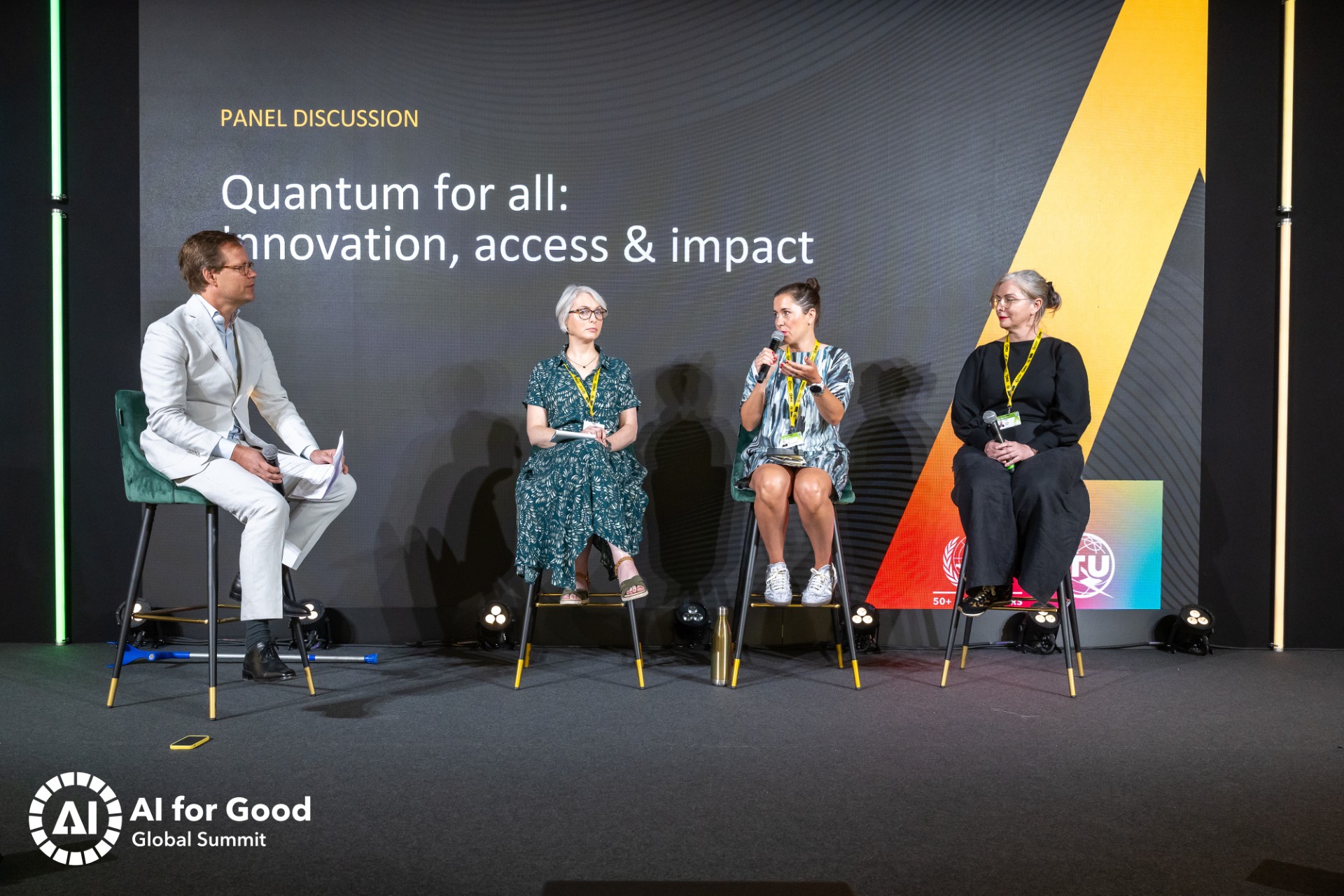Shaping responsible quantum innovation at AI for Good
21st July 2025
Article by Alexia Yiannouli

Photo by AI for Good
OQI recently participated in the AI for Good Summit, organised by the International Telecommunication Union (ITU) from 8-11 July 2025.
As part of the Quantum for Good track, OQI collaborated with ITU to build an engaging program of discussions on how quantum technology has the potential to drive real-world impact. Through a series of panels and talks, participants explored the role of responsible innovation in shaping a future where quantum advancements benefit all, not just a few.
From innovation to impact
At OQI, we are supporting the development of quantum computing use cases that aim to accelerate progress of the UN Sustainable Development Goals (SDGs), with tangible benefits for society. This topic was at the heart of the panel discussions on how quantum is transforming sectors today, moving from ideas to real-world applications.
Moderated by Dr. Catherine Lefebvre (Applications Lead and Senior Advisor at OQI) the panel highlighted the importance of multidisciplinary international collaboration in shaping the responsible development and governance of the technology.
Key topics discussed during the panel included:
- The need to continuously adapt in innovation to bring quantum solutions from ideation to maturity with positive impact.
- The necessity of multidisciplinary collaboration between academia, industry, and UN agencies, along with the engagement of global communities, to design and test quantum applications that will benefit society and our planet.
- How to address and mitigate the hype, staying honest and rigorous to capabilities and timelines of current technology.
What happens when the code breaks?
While quantum computing has great potential, it is important to address its biggest risk: the threat to cryptography. Dr. Mira Wolf-Bauwens (Head of Initiatives Development at GESDA, Advisor to OQI) moderated a panel exploring post-quantum security, assessing the cryptographic risks posed by quantum computers and what we can do about them. The risk to encryption is no longer a distant concern, it’s one that needs to be addressed now, not later. With quantum computers expected to break conventional encryption in the future, cryptographers are urging us to undergo necessary preparations to become quantum-safe. Panelists examined the opportunities and risks alongside what we can do about them, and how we can make sure that we have the necessary capabilities in place well before they are needed. They stressed that there are open source solutions today that can be implemented and that both companies and countries alike should ensure they have a roadmap to quantum security, and do not underestimate the time it takes to update the security.
Why should we care about diplomacy in quantum technology?
This question was at the forefront of a panel moderated by Maricela Munoz (OQI Governance, Director of External Affairs at GESDA) and including H.E. Ambassador Omar Zniber (Permanent Representative of Morocco to the United Nations Office and other international organisations in Geneva and OQI Advisory Committee Member) and Dr. Eleni Diamanti (CNRS Research Director at the LIP6 laboratory of Sorbonne University and Cofounder and Scientific Advisor at Wellinq).
Bringing together representatives from diplomacy, academia and industry, the panel explored how the rapid development of quantum technology requires proactive and inclusive governance frameworks. Key topics from these discussions included:
- The need for anticipation – highlighting how the governance must evolve alongside the technology, not behind it, to ensure its development benefits society as a whole, not just a select few.
- The role of platforms such as OQI, providing a model for responsible innovation through building global capacity, developing SDG-focused quantum computing use cases, and its approach to anticipatory governance.
- The importance of International Geneva as a global hub for diplomacy, ensuring the inclusion of diplomatic voices in conversations around responsible quantum governance.
Quantum for all: who should shape the governance of quantum technologies?
This topic was explored by Mira Wolf-Bauwens (Head of Initiatives Development at GESDA, Advisor to OQI) as a panelist on how we can ensure quantum innovation, access and impact are developed for the benefit of all. Also representing OQI on the panel was Diederick Croese (Director of the Centre for Quantum & Society, QuantumDelta NL Lead, OQI Advisory Committee Member), who moderated the panel, alongside Dr Clare Shelley-Egan (QuantumDelta NL) and Dr Justine Lacey (CSIRO, AUS) – other prominent voices from the Responsible Quantum Community.
The panel addressed key challenges and opportunities:
- How the lessons learned from AI’s rapid development can guide the inclusive development of quantum technology.
- Building the necessary safeguards for equitable governance models.
- Ensuring that all voices have a place at the table – reinforcing OQI’s role in actively providing a platform doing this.
- Collaboratively and inclusively defining what we mean by “good”.
- Ensuring that actions follow from commitments.
It was a fantastic opportunity to see members of the OQI community and the wider quantum ecosystem come together to discuss these important topics, from responsible innovation to the societal impact of quantum technologies, as we continue to work towards shaping the future governance and application of the technology.
Find out more information about the AI for Good Summit: https://aiforgood.itu.int/
